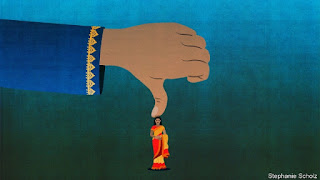2018 July - The Important Choice of Empowering Women
0 comments
 |
| Picture Credit: The Economist |
In 1967 the UN Member States adopted the Declaration on the Elimination of Discrimination against women. The articles in the declaration clearly seek to ensure women have equity with men and to have a freedom as a human being to make choices about how to live their life. In 1979 the Convention of the Elimination of All Forms of Discrimination against Women was adopted. It was clear in 1979 that in the 12 years since the Declaration of 1967 there was little being done to bring about the equality and freedom of women in the UN Member States. The convention went further than the Declaration in that it not only addressed discriminatory laws but it extended its reach to the practices and customs that discriminated against women in a socio-cultural context. The Convention seeks to eliminate the social, cultural and traditional patterns of discrimination. The countries of the UN have agreed to supporting these changes in their states and the role of the UN is to hold them accountable to that as a collective group.
So, how are we going? 51 years and counting since the Declaration was signed. There are 195 countries in the world and 193 are signed on to the United Nations. Only the Holy See and Palestine are not members. The Holy See and Palestine aside, there should be some notable differences by now in the way women are treated. A recent survey found that even in the most egalitarian countries the gender gap is still prevalent. Norway is 3rd best in the Global Gap Report 2016 for equality between men and women, but still for every $1 earned by a women, a $1.27 is earned by a man.
"On average, for every $1 a woman earned in Norway, a man earned $1.27, which translates to an average annual salary equalling about $57,856 for women and $73,257 for men. Just slightly under 76 percent of Norwegian women are part of the national labour market, while Norwegian men's participation is 80 percent." (The Local, 2016).
Just recently our beloved India came under the microscope in this area. Thomson Reuters Foundation produced a report stating that India is the most dangerous country for women. Reuters quickly reinforced their story with a second one declaring sexual violence in India against women was rife. India was shocked by these reports. As it so often happens, when in shock denial sets in. Indian politicians set about falsifying the report with many commentators agreeing with the denial approach.
The Economist subsequently published a story on the extreme lack of equality of women in the Indian workforce describing the amount of women missing from the Indian workforce is a glaring problem. The Economist does better than Reuters in that it offers India an attractive outcome to rectifying the issue of inequity in the work force; it demonstrates that if India was to re-balance its workforce it would be 27% richer. In the worlds biggest democracy that number is very significant.
"Men have taken 90% of the 36m additional jobs in industry India has created since 2005. And those who say that women themselves prefer not to work must contend with plenty of counter-evidence. Census data suggest that a third of stay-at-home women would work if jobs were available; government make-work schemes attract more women than men." (The Economist, 2018).
India is an amazing country, the people are incredibly kind, the culture is rich with history and living in a 'right' way is important part of the way of life. Every country has its issues and they are sore points for that country. Of course Indians will react to having their country seen in such a negative way when there is so many positives also. The fact is we all do that. And according to this rant it is extremely evident that the neglect of women's rights it is a pandemic problem. I am using these articles to demonstrate how little progress we have achieved since the UN signed its Declaration of the Elimination of Discrimination against Women.
Whats the hold up then?
I think we point the finger at others too often. It seems clear that legislation, declarations and conventions are not working. We have countries claiming to be better than others yet they still cannot claim to have equal pay (a basic indicator of equality). It cannot be the governments role to fix this issue. It has to be us. We have to begin with our habits, patterns, mind-sets and beliefs. We cannot change others. We have to change ourselves. We cannot wait for others to lead us. We have to be prepared to make choices in our daily lives that promote the human rights of others; of women. I can make a difference when I make a purchase. Be informed about the product. Who made it and where was it made? Does buying this product support women's rights or not? It takes more effort. It costs more (because it does not support slavery). BUT YOU CAN MAKE THE DIFFERENCE.
Michael Porter is a Business Lecturer at Harvard University. He demonstrates some of the issues and benefits we have in seeing business as part of the solution. While there are always naysayers with regards to business as a social change agent I think he makes a great point. Some people say that the problem with business as change agent is that we do not get a say in how they operate and a lack of trust. Business is compared to a trustworthy government which you vote for. I disagree. I think governments have proven to be equally untrustworthy at times. As far as voting is concerned, I think we hold all the power when it comes to businesses with regards to social change and business ethics. We vote with our wallets. Michael Porter eludes to this when he demonstrates that the issue with NGOs as a social change agent is the lack of finances in NGOs. Whereas businesses have finances and therefore have the 'scale' that NGOs do not. We have given these businesses that scale and ability to shape our world. Maybe if we are as careful with our wallets as we are with our voting papers we would realize the massive impact our choices can make.
That is why Holi Boli exists (shameless plug). We want to help you to make a difference in the world by offering products that are beautiful for you to wear but also empower women in rural India. There are other companies with the same ethos. We offer high quality products, beautifully made with the back story of trying to make a positive difference in the lives of those who work there. We use our profits to empower others and offer vocational training to women who will not even work at Holi Boli but they're enabled to sew from home and earn their own money, work at a local tailor shop, a few ladies have opened their own sewing school to help others, or opened their own 'ladies tailor' shop. It really is the ultimate win-win. We win, you win, our women win and India wins. As you support these companies, the others take notice where you are spending and why you are spending. That is what businesses do. Take McDonalds for example, you demanded coffee, you demanded healthier options and McDonalds responded. Your selective purchasing forces other companies to comply to the standards and culture your choices have dictated.
Of course, it is more complicated that just this. However, let us not underrate the influence our choices have on the world. I couldn't help as I read through the above articles over the last few weeks and be reminded how important all this is. WE make a difference through our choices. It is us! We are responsible!
Buy ethically made. Buy earth sustainable. Buy quality.
Find brands and businesses that support the principles that make a positive difference in the world. Don't be a finger pointer. It is up to us to make the important choice to Empower women.


















